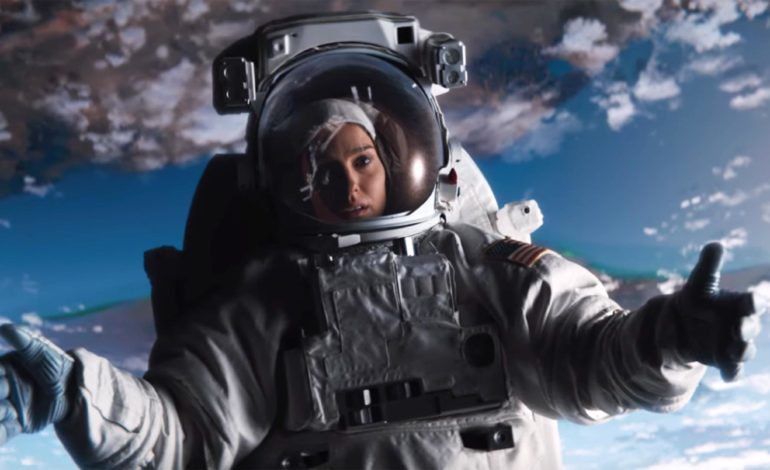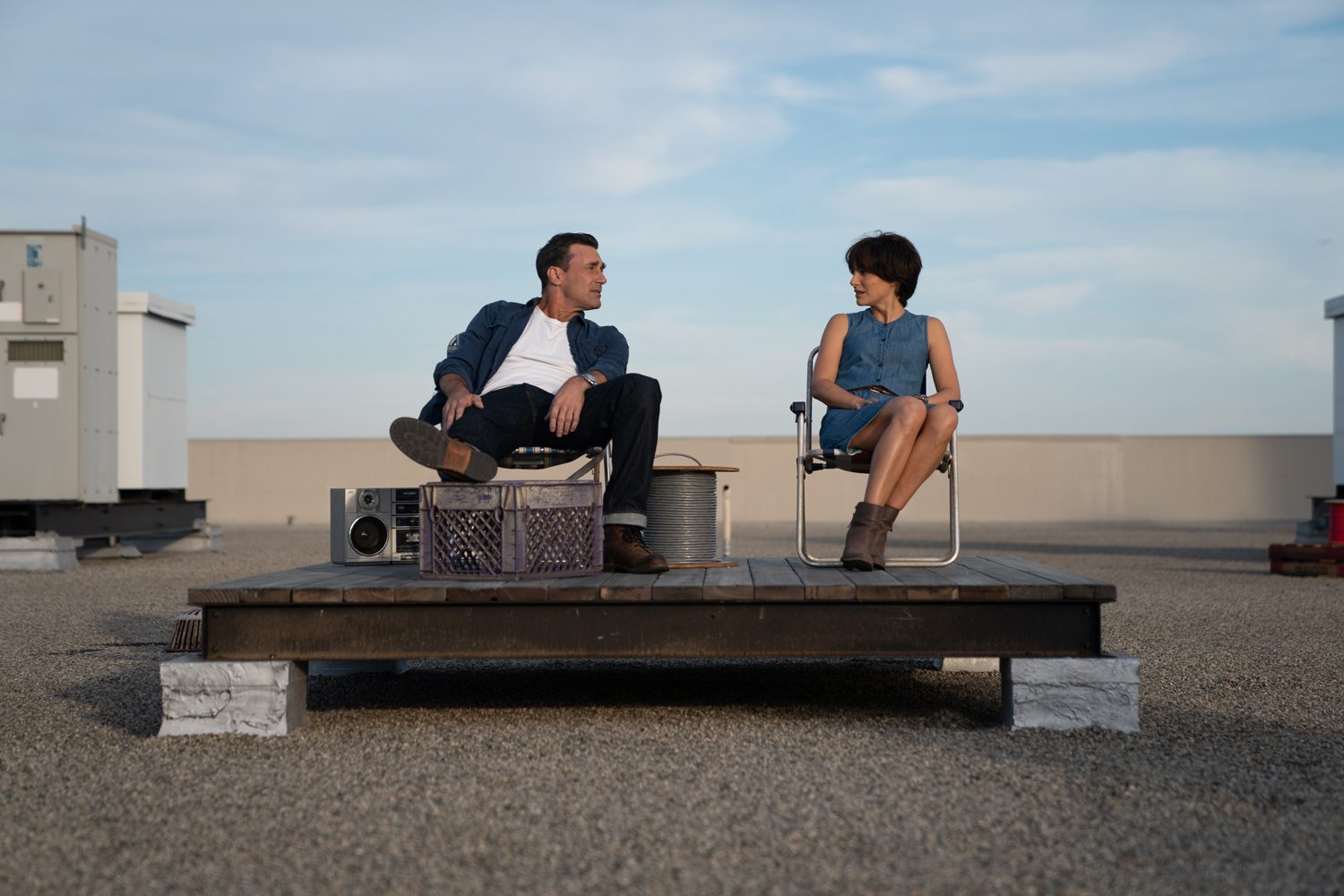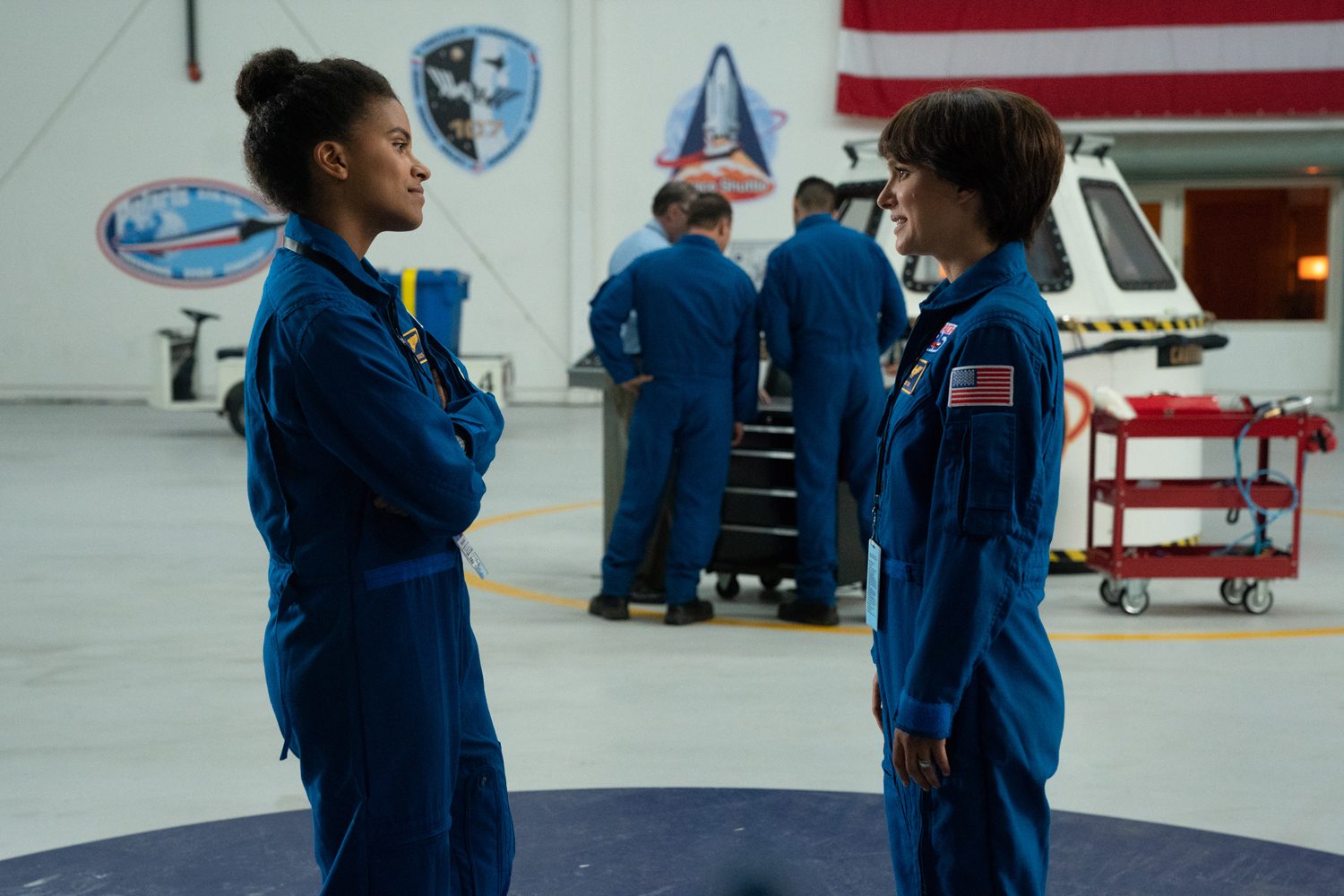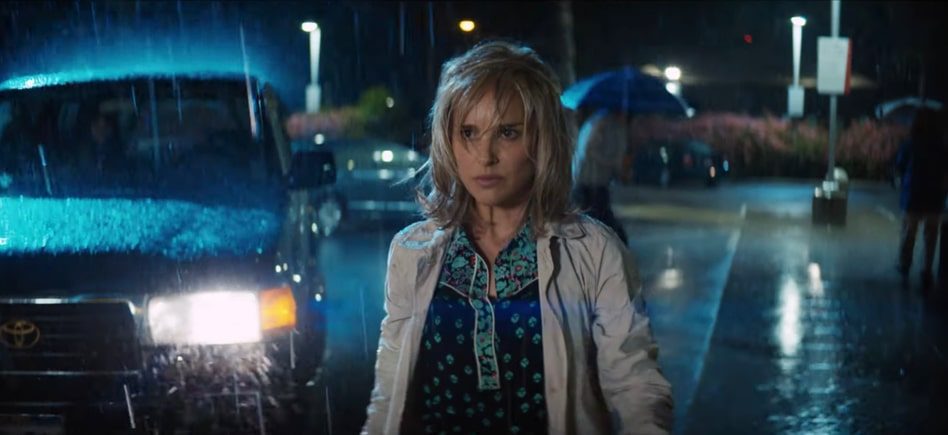

While flying down the road in a mental state somewhere between blind rage and determination, Lucy Cola (Natalie Portman) asks her niece Blue Iris (Pearl Amanda Dickinson) “Why did the chicken cross the road?” Before raving about the ambitions and plight of said chicken, Lucy declares that the real question is how, not why. Well, when it comes to this film, both questions are valid: you might leave the theater wondering exactly why and how Lucy in the Sky got made.
After Lucy returns from a mind-bending space adventure, she becomes frustrated with the mundanity of human life and no longer feels satisfied with her, um, “weak-handed” husband (well, you know what they say). This is a guy who says things like “Hey sleepyhead, how’s rocket lag?” and “Mission accomplished!” after rebuttoning his wife’s pajamas. This is Drew, played by Downton Abbey’s Dan Stevens, sporting the dad-est mustache and khaki shorts to ever grace the screen. Stevens does very well with what he’s given, but his character barely deepens past a well-meaning goober doomed to become a tragic portrait of cuckoldry.
As the film shows through excessive, Malick-esque flashbacks and graphic matches, everything in Lucy’s normal life reminds her of outer space. Even her speckled stucco ceiling makes her crave the infinite starry sky. Now that she’s had a taste of the cosmos, this world feels insignificant. She lies and tells her psychiatrist, Dr. Plimpton (Nick Offerman), that she’s fine. But Lucy finds solace in a bowling group comprised of fellow astronaut Mark Goodwin (Jon Hamm) and two other NASA employees (Burn Notice’s Jeffrey Donovan and comedy’s Tig Notaro). They bowl and drink and talk about the great unknown in a way Lucy can’t do with anyone else.


Lucy begins an affair with Mark but becomes jealous when she suspects he’s seeing Erin Eccles (Zazie Beetz), an astronaut who Lucy is both mentoring and competing against for a spot in the upcoming Orion mission—the one thing Lucy really cares about. One night, while Lucy is with Mark, her grandmother (Ellen Burstyn) suffers a stroke and slips into a coma. She soon dies, and Lucy leaves Drew—accompanied by Blue Iris—at the memorial service. Thus begins Lucy’s downward spiral.
Until this point, my biggest problem with Lucy in the Sky was probably Portman’s mushroom cap of a wig. I wasn’t crazy about the pretentious memory jumps and orchestral swells, but I thought the film might land a generous 3 out of 5 if it eventually made its point. However, the last portion of the movie, which is based on astronaut Lisa Nowak’s stalking of William Oefelein (real-life Mark) and attempted kidnapping of Colleen Shipman (real-life Erin), destroyed what little interest I had in the film.
For some bizarre reason, Lucy in the Sky chooses to spend its final act following Lucy on a manic quest to track down the people who wronged her. She tries to attack Mark for telling their boss Frank Paxton (Colman Domingo) that she is unfit for missions, causing Paxton to deem her “too emotional” to be sent up again. She then warns a bewildered Erin that men like Mark will try to undermine her.


I’ll admit, there is an intriguing push-and-pull in the film’s decision to expose misogynistic conventions—i.e. calling women emotional, unhinged, hysterical—while admitting that characters who say those things here sort of have a point regarding Lucy’s case. You know they’re right, but you hate the way they go about it. For the record, I don’t think the film is trying to legitimize this kind of sexist behavior by saying it’s always founded. I just think it’s a smart storytelling device that complicates the narrative and characters, making them right and wrong at once.
At the same time, however, the film might be in danger of enforcing the idea that space travel makes everyone go nuts. Lucy in the Sky is supposed to be about the mental and emotional effects of visiting the void—the dissonance, the isolation. But by contextualizing the story in an exaggerated retelling of Nowak’s crimes, Noah Hawley and company simplify those effects down to what I would like to call the “Space Crazies.” The Space Crazies are what you get when you’re away from Earth too long, and they might make you sabotage your entire life. They might even make you wear a bad wig on top of another bad wig and spray mace into Jon Hamm’s eyes.
I applaud the actors who attempted to resuscitate this screenplay, which was dead on arrival. Portman is convincing enough, although I’m wondering how she managed to steal Jodie Foster and Holly Hunter’s vocal cords. Stevens is fantastic, but I wish he were given more to do. Beetz does just fine and is given even less. Burstyn earns every chuckle from the audience. Hamm is perfect as what Drew calls the “divorced action figure.” He drinks at work, naps on his office couch, and sleeps with everyone within a ten-foot radius… he’s basically Don Draper in space.


Interestingly enough, Hawley—who both directed and co-wrote Lucy in the Sky—has worked on some highly acclaimed TV shows. He’s probably best known for Fargo, Legion, and Bones. The other writers, Elliott DiGuiseppi and Brian C. Brown, also come from a television background. Let’s hope that this is not their cinematic legacy.
Verdict: 2 out of 5 Stars
Despite its stellar cast, Lucy in the Sky fails to dazzle. With its surface-level exploration of Lucy’s turmoil, clunky metaphors, whiplash-inducing aspect ratios, and ballistic third act, the whole thing is a mess. It’s a shame, because its premise—the jarring experience of staring into oblivion one day and sitting in an Applebee’s booth the next—is a fascinating one. I hope someone else will take another stab at illustrating the astronaut’s disorienting transition from space travel to pedestrian life, rather than turn it into a high-budget Lifetime movie. In the meantime, let’s hope The Beatles aren’t ruined forever.
